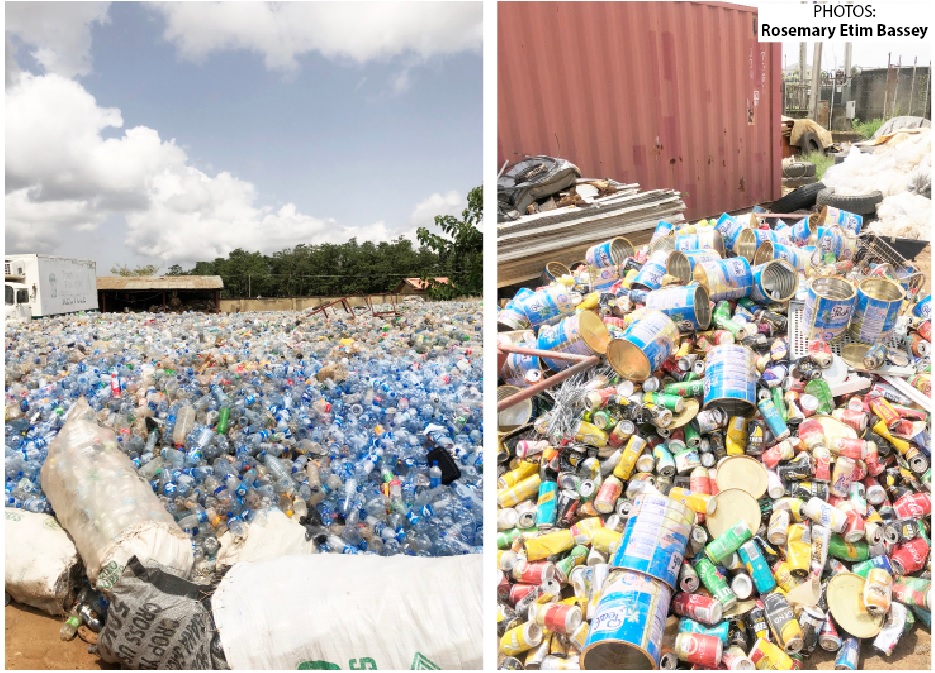With a population of over 200 million, Nigeria generates almost 42 million tonnes of waste material which, if properly handled, can be recycled into semi-raw materials for production. Daily Trust Saturday spoke to entrepreneurs who are in the recycling business to study the prospects and growth of the industry.
The challenge of proper waste management has been on the rise due to the growth in population and industrial activities in the country. Dumping of solid waste such as bottles, pure water sachets, can drinks etc, in inappropriate areas such as roadsides, gutters have become a common habit practised by many Nigerians.
- INEC job: Evidence shows Onochie lied to Senate panel
- Nigerians urge support for military as criminals kill 183 soldiers in 6 months
Even with a load of policies being set in place, waste management continues to be one of the biggest environmental issues in Nigeria.
Compared to other countries, the recycling industry in Nigeria is still to be maximised to deliver its best output. Very few Nigerians have been sensitized on how to dispose of waste, the quality of waste and what to do with recyclable waste.
Abu, who mostly picks garbage around the Durumi – Apo axis in Abuja, disclosed that he makes at least N30,000 monthly from picking up plastic and other recyclable materials. “In a day, I can pick up between 100-200 bottles from the dumpsite and if I’m able to pick more valuable things like batteries, steel, aluminium etc, I can make between N40,000 to N60,000,” he said.
Abu also disclosed that there had been an increase in the sale of PET bottles as prices have now gone from N20 per kg to N40.
To know and understand more about recycling, Daily Trust Saturday spoke to Olufunto Boroffice who runs Chanja Datti, a waste management and recycling company in Abuja. Funto explains that with the amount of waste generated in Nigeria, there’s a lot of profit to be made from the recycling industry.
At Chanja Datti, waste collectors stroll-in in their numbers on a daily basis with their pile of waste for recycling. These collectors often go through large garbage piles to select and sort out recyclable materials.
For Murtala Abdullahi who brings in waste at Chanja Datti, he tries as much as possible to bring in a lot of waste on a daily basis to increase his calculated salary. He explained that; “the garbage we bring in is piled up for a month and the volume is multiplied by N20 to determine our salaries. Depending on the weight of my pile, I could earn up to N50,000 a month. Sometimes, it might be more, sometimes it may be less”. Murtala says the money he earns from collecting waste is sustainable enough for him.
Olufunto has been in the recycling business for a period of six years and her factory recycles at least 3,000 tonnes of solid waste material yearly. Funto’s company is also into recyclable waste collection, processing of waste into semi-raw materials etc. Funto’s waste collectors bring in all sorts of recyclable waste such as bottles, cartons, paper, cans, batteries, tyres, glass bottles etc. “the hardest recyclable material to get is metal because it is valued as high-quality waste,” she said.
Daily Trust Saturday also spoke to Chijike Amagwu, who works with Recyclan, a recycling company in Lagos that is into the recovery and recycling of PET plastic. He mentioned that the company recycles at most 2,500 tonnes of PET plastic in a month in Lagos. He further stated that “In a month, we could sell off at least 2,500 tons of PET plastic to companies who need it.”
Funto describes recycling as a very profitable venture as the waste being recycled is sold as semi-raw materials to companies who need them for production. She, however, mentions that there are some expenses that if not properly managed can cut into the profit being made. She explained that; “I always tell people that if you want to earn more money, you have to collect more waste and most importantly, more valuable waste.”
Chijike also says the recycling business is an untapped oil field for the Nigerian business sector. “At the end of 2020, we were able to record a total sum of $2 million as revenue in Recyclan.”
In the recycling business, hot washed flakes are the most expensive kinds of resin and cold washed flakes are the cheapest. Chijike disclosed to Daily Trust Saturday that at Recyclan, a ton of recycled materials can be sold for at least 300 euros a ton or at most 650 euros a ton.
With unemployment on the rise in the country, Funto states that the government investing in the recycling sector is bound to create more job opportunities for citizens. “Within all our branches, we have a workforce of about 200 people and with the hope of expansion, we intend to create more job opportunities for people.”
Recyclan has also been able to improve the unemployment rate in the country as Chijike noted that “We directly employed 170 people and indirectly, through our off-take capacity, we employed over 5000 people.”
He further explained that “Recovery of waste is one of the largest means of income for the informal sector which will drive financial inclusion.”
Funto also explains that the economic impact of recycling cannot be ignored. She explained that: “We have countries who are now trying to add recycled materials to building materials to make their roads, not because plastic is cheaper but because it is not easily degradable like other materials and this saves the government cost on buying new materials.”
Through the partnership, Funto and her team have been able to set up cash for trash hubs where people can come to deliver their trash and be given incentives in return. “A lot of times, we hear people complain that they do not know where to turn in their recyclable trash and that is why we have set up recycling hubs around Abuja where people can easily go and drop off their recyclable waste,” she said.
Asides from that, Funto also runs bottles for books and bottles for justice initiative where children who bring recyclable items are given books in return or legal aid services.
However, Funto complains that the lack of proper infrastructure and power supply plays a big challenge for her business. “In a month, we spend almost a million naira just between paying for light and buying diesel because without power, the machines cannot work and the waste will not be recycled,” she said.
She also expressed concern as to the lack of awareness and sensitization on recycling in Nigeria. “If people knew more about recycling, the streets won’t be littered with plastic bottles, the gutters won’t be clogged with pure water sachets,” she said.
She further explained that “Most of the companies who buy recycled waste are mostly in the eastern and western parts of the country and having to move these materials from point A to point B have become difficult due to bad state of our interstate roads.”
Chijike also expressed concern over the lack of sensitization on the single use of commodities. “The biggest challenge we face is the lack of recycling culture and knowledge on the single use of commodities, especially plastic,” he said. He also said that there was a decline in investment and funding in the recycling industry.




